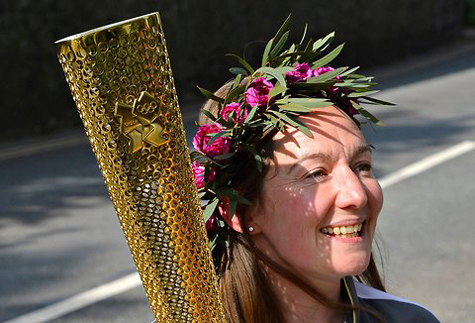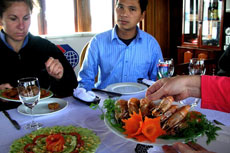Human Flower Project
Her Honor for a Potato Crop
Should a community garden director be free to hawk her Olympic torch?

Route of the Olympic Torch, May 26, 2012
Image: London Olympics 2012
Sarah Milner Simonds was honored by the Olympic committee to carry the Olympic torch along part of its route to the 2012 summer games. Simonds, a 38-year-old horticulturist, was chosen for her work with People’s Plot, “a community allotment in South Acton [West of London], where we can grow our own fruit and vegetables, cook and eat the food we grow together.”
But before Simonds ever trotted her segment of the Olympic relay, her honor was besmirched: she had tried to sell her torch on ebay.
According to the New York Times, the winning bidder offered 153,100 pounds, ($242,323) last Sunday, meanwhile drawing down the fury many observers – though the unnamed buyer has yet to pay up.
Simonds defended her position, saying she intended to plow all proceeds from the sale back into People’s Plot: “There are still lots of people who feel strongly that these iconic torches are somehow sacred and that trading demeans their value,” Simonds said. “To these I would ask how exactly can we plant our potatoes using a torch? They obviously didn’t understand my motives.”
Several other torchbearers likewise have tried or are now trying to sell their Olympic flame-carriers, and most of them too have designated specific charities as beneficiaries.
Are honorifics transferable commodities? There are plenty of Olympic medals up for sale on ebay right now. Does it matter that Simonds didn’t win her torch, rather that it was conferred upon her by the Olympic committee? Since she didn’t have to toss a shot put farthest or run fastest for it, does that make the object any less hers to do with as she pleases, or more so? Do her charitable motives make a difference?
The American Academy of Motion Pictures Sciences confronted the problem back in 1950, after a trade in Oscars has begun. In 1950 the Academy began binding winners to an agreement banning them or their heirs “from selling their Oscars to anyone but the Academy for the nominal sum of $1.”
Academy Awards made prior to 1950 are exempt. Michael Jackson bought the 1939 Best Picture Oscar, awarded to “Gone with the Wind,” for $1.54 million in 1999. Other less renowned statuettes, all awarded pre-1950, have sold at auction too.

Sarah Milner Simonds of the People’s Plot, crowned with flowers and carrying the Olympic torch in Dunster, Southwest England, May 21.
Photo: Toby Melville, for Reuters
But back to Sarah Milner Simonds and her effort to convert the torch given for her work with the community garden into money to support that garden. Was she wrong to turn this status symbol into a commodity?
Initially we thought she was in the wrong. It struck us as demeaning to the games and a transgression of their ethics of amateurism and global friendship for one honored participant to exchange her bit of communal Olympic glory for a personal cause – no matter how many vegetables might result. The glory wasn’t hers, really. It belonged to the games, which generously had shone a light on her worthwhile endeavors. It was as if she were taking the ball and going home with it herself. Bad sportsmanship!
But then we noticed another detail in the Times story.
“Most of the torchbearers who participate in the relay were nominated based on work in their local community or an inspiring personal achievement. They are given the option to purchase the torch for $314 (in advance of their run) to $339 (day of run).”
This arrangement changes the dynamic considerably. It was not Simonds who first commodified the object but the Olympic committee itself. Since the committee failed to make Simonds’s torch a free gift, rather sold it to her (granted, for a very low price), she was within her right to resell it.
Tacky, yes. But unethical, no. We hope Simonds’s ebay buyer comes through and the People’s Plot prospers for years to come.


Interesting story. I wonder what would have happened if she waited until the Games were over…